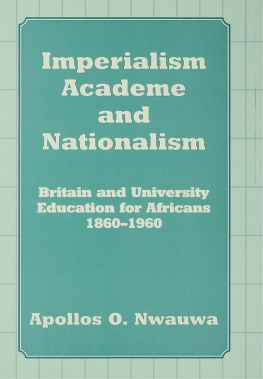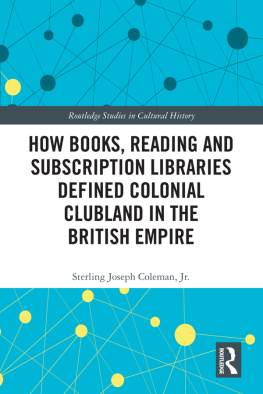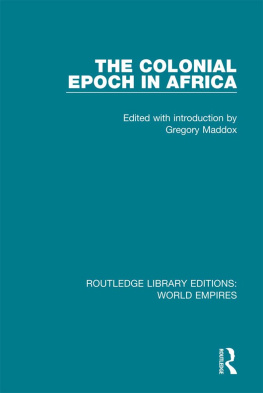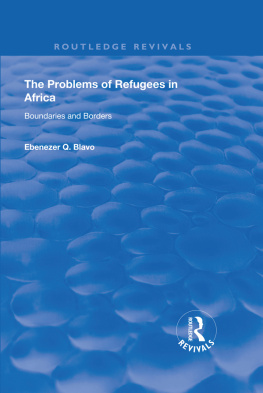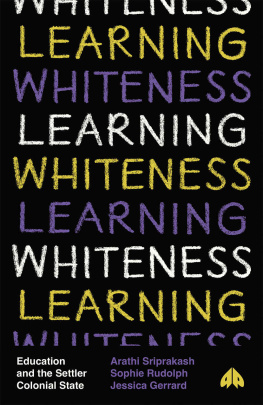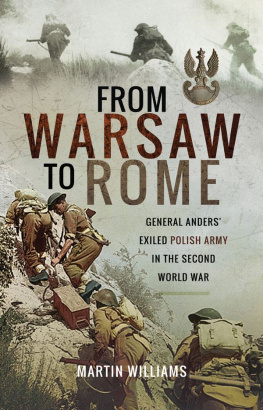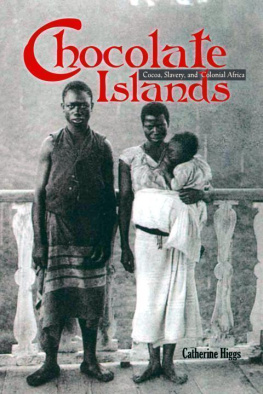Jochen Lingelbach - On the Edges of Whiteness: Polish Refugees in British Colonial Africa during and after the Second World War
Here you can read online Jochen Lingelbach - On the Edges of Whiteness: Polish Refugees in British Colonial Africa during and after the Second World War full text of the book (entire story) in english for free. Download pdf and epub, get meaning, cover and reviews about this ebook. year: 2020, publisher: Berghahn Books, genre: Home and family. Description of the work, (preface) as well as reviews are available. Best literature library LitArk.com created for fans of good reading and offers a wide selection of genres:
Romance novel
Science fiction
Adventure
Detective
Science
History
Home and family
Prose
Art
Politics
Computer
Non-fiction
Religion
Business
Children
Humor
Choose a favorite category and find really read worthwhile books. Enjoy immersion in the world of imagination, feel the emotions of the characters or learn something new for yourself, make an fascinating discovery.

- Book:On the Edges of Whiteness: Polish Refugees in British Colonial Africa during and after the Second World War
- Author:
- Publisher:Berghahn Books
- Genre:
- Year:2020
- Rating:3 / 5
- Favourites:Add to favourites
- Your mark:
- 60
- 1
- 2
- 3
- 4
- 5
On the Edges of Whiteness: Polish Refugees in British Colonial Africa during and after the Second World War: summary, description and annotation
We offer to read an annotation, description, summary or preface (depends on what the author of the book "On the Edges of Whiteness: Polish Refugees in British Colonial Africa during and after the Second World War" wrote himself). If you haven't found the necessary information about the book — write in the comments, we will try to find it.
Jochen Lingelbach: author's other books
Who wrote On the Edges of Whiteness: Polish Refugees in British Colonial Africa during and after the Second World War? Find out the surname, the name of the author of the book and a list of all author's works by series.
On the Edges of Whiteness: Polish Refugees in British Colonial Africa during and after the Second World War — read online for free the complete book (whole text) full work
Below is the text of the book, divided by pages. System saving the place of the last page read, allows you to conveniently read the book "On the Edges of Whiteness: Polish Refugees in British Colonial Africa during and after the Second World War" online for free, without having to search again every time where you left off. Put a bookmark, and you can go to the page where you finished reading at any time.
Font size:
Interval:
Bookmark:
On the Edges of Whiteness
Polish Refugees in British Colonial Africa during and after the Second World War
Jochen Lingelbach

First published in 2020 by
Berghahn Books
www.berghahnbooks.com
2020 Jochen Lingelbach
All rights reserved. Except for the quotation of short passages for the purposes of criticism and review, no part of this book may be reproduced in any form or by any means, electronic or mechanical, including photocopying, recording, or any information storage and retrieval system now known or to be invented, without written permission of the publisher.
Library of Congress Cataloging-in-Publication Data
A C.I.P. cataloging record is available from the Library of Congress
Library of Congress Cataloging in Publication Control Number: 2020006097
British Library Cataloguing in Publication Data
A catalogue record for this book is available from the British Library
ISBN 978-1-78920-444-5 hardback
ISBN 978-1-78920-447-6 ebook
It all started with Mzee Asman. We were sitting in the shady courtyard of the old mans house in the Kijitonyama neighbourhood of Dar es Salaam in 2009. His wife and some young neighbours had joined the conversation, and only a few roaming chickens disturbed the quiet setting. I was conducting an interview for my diploma thesis on the urban structure of the town and the influence of its colonial segregation on the present-day perception of one particular neighbourhood. There had, however, been a transit camp for Polish refugees near Dar es Salaam, which I read about much later.
Hearing from Mzee Asman about the unexpected sojourners in East Africa, this story drew my interest. After finding out more about the way and reasons for their coming to Africa I was wondering how this story would fit into the history of colonial rule. I had always taken the racial division and hierarchy of colonial societies for granted. The presence of white refugees contradicted the conventional image of societies where whites ruled and profited while Africans were exploited. I enquired further into their history, and revised this schematic concept of colonial society. Coming from an African studies background I also started to learn about Polish history a history that was much closer to my own family history than I had earlier thought. My maternal grandmother grew up in Wrocaw at a time when it was a German town called Breslau. She had been an active supporter of the Nazi regime, but later deeply regretted her involvement. What was my position in this regard? I thought I was an outside observer of a story that had only distant links to myself. It turned out, however, that the entangled history of war displacements and colonialism had come full circle. People had been deported due to the combined aggression of Soviet and German forces, then released because of the German attack on the Soviet Union. Many of them became part of the forces that eventually liberated Germany. Some of the civilians found a safe place in a former German colony where I arrived sixty years later as an exchange student. It is an enmeshed, small world indeed.
Ever since Mzee Asman hit me on the topic, there were friends and colleagues who spent time and energy to keep my enthusiasm high and help me focus on the interesting issues. Over the years I refined my short version to the surprising question of why and how Polish refugees ended up in Africa. It was a long process, but I never lost interest in this astonishing story. Along the way, the so-called refugee crisis reached European headlines and my obscure topic drew more interest. The story of the Polish refugees in Africa does not, however, only offer a simple narrative of reversing flight directions. Its complexity urges us instead to critically engage with both, simple analogies as well as the short-sighted ignorance of history. But before delving into this fascinating story I wish to thank some of the people without whom I would never have been able to write these pages.
First of all I have to thank the organizers of the DFG research training group Critical Junctures of Globalization, Matthias Middell and Ulf Engel, for the generous funding that gave me the material basis to conduct my research. Apart from the financial support, it was a pleasure to take part in the vibrant discussions of the group. The seminars, colloquia, Winterklausuren and Summer schools influenced my own theoretical approach and provided great opportunities to discuss wider issues and to present draft chapters of this study, which helped to clarify my argumentation.
My PhD supervisor, Adam Jones, was always there when I needed support and encouragement. His rigorous and critical approach towards sources, his meticulous way of history writing and his broad knowledge of African history deeply influenced my own research. Twice a year I had the honour to make the long journey to his idyllic home in the village of Polenz. It was always a wonderful occasion to discuss issues with an inspiring group of colleagues in a relaxed but concentrated atmosphere. In Polenz I presented drafts of most chapters of this book and received numerous useful comments that always gave me food for thought, and ideas about how to refine my texts. Many of the Polenz people have followed my writing from the first proposal until the last drafts. Among them were Tina Kramer, Silke Strickrodt, Joram Tarusarira, Anne Beutter, Dmitri van den Bersselaar, Geert Castryck, Rose Marie Beck, Michaela Unterholzner, Hatice Uur, Peter Lambertz, John Njenga Karugia and many more. Luckily, Stefan Troebst agreed at short notice to act as my second supervisor. His extensive knowledge of the entangled history of East Central Europe helped me to better grasp the Polish part of this history, of which I had been no specialist at all.
In 2016 I had the opportunity to work with Jol Glasman in his project The Invention of Refugee Camps (funded by the DFG as part of the SPP 1488 Adaptation and Creativity in Africa) at the Centre Marc Bloch in Berlin. Thanks to his support, and the openness of the centres director, Catherine Gousseff, and colleagues, I profited from discussions on aspects of this study and enjoyed the welcoming atmosphere at the centre. In 2018, on the invitation by Kerstin Stubenvoll, I took part in a project on refugee history at the memorial site House of the Wannsee Conference in Berlin. Through the writing of short texts and selection of primary documents on the Polish refugees for educational use in schools, I learned another, more accessible, way to impart historical knowledge.
During the writing and rewriting of this book I had numerous informal exchanges and discussions with my colleagues in our Berlin office community. Lunchtimes especially were often an opportunity for personal exchanges and encouragement that helped me to finally finish this project. Friends and colleagues like Manuela Bauche, Jan Zofka, Frank Usbeck and Katarzyna Nowak gave me crucial feedback on various parts of the manuscript. Another special group of people were the members of the project clinic African history. It helped a lot to have this protected forum of mutual aid, both from a professional and personal perspective.
On two occasions I visited the National Archives of the United Kingdom in secluded Kew, the archives of the former Polish government-in-exile in the Polish Institute and Sikorski Museum and the library of the lively POSK in Hammersmith. The national archives in Dar es Salaam and Nairobi both offered invaluable material from the local administration. My sincerest thanks to Alexander Makulilo at the University of Dar es Salaam for providing me with the support for the Tanzanian research permit clearance. One brief but fruitful research trip brought me, rather unexpectedly, to the French national archives in Paris where the records of the International Refugee Organization are stored. And one last trip led me to Oxford where I consulted some private papers in the special collections of the Bodleian Libraries. While these archives differed greatly in terms of their technical facilities and financial means, the people working there were invariably welcoming and helpful.
Next pageFont size:
Interval:
Bookmark:
Similar books «On the Edges of Whiteness: Polish Refugees in British Colonial Africa during and after the Second World War»
Look at similar books to On the Edges of Whiteness: Polish Refugees in British Colonial Africa during and after the Second World War. We have selected literature similar in name and meaning in the hope of providing readers with more options to find new, interesting, not yet read works.
Discussion, reviews of the book On the Edges of Whiteness: Polish Refugees in British Colonial Africa during and after the Second World War and just readers' own opinions. Leave your comments, write what you think about the work, its meaning or the main characters. Specify what exactly you liked and what you didn't like, and why you think so.

